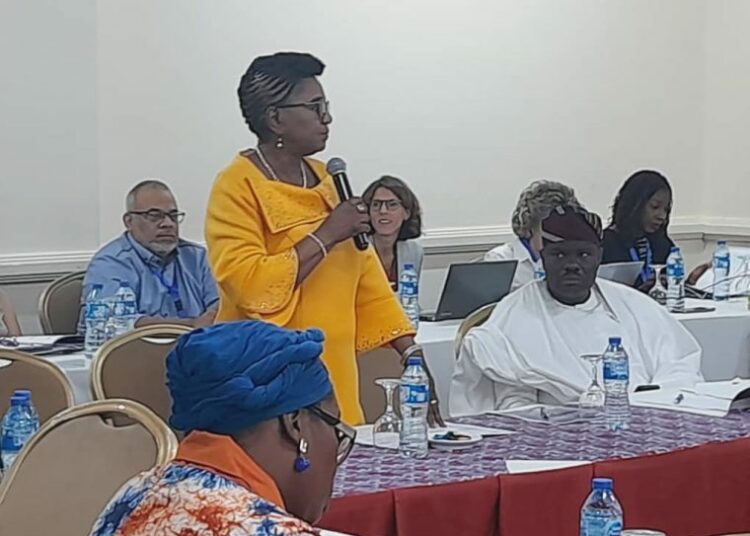The Federal Ministry of Health and Social Welfare has revealed that a National Policy on Health Workers’ Migration has been developed to address the issue of health workers migration in the country.
The Deputy Director, Health System Department of Health Planning Research and Statistics, Dr Nwakaego Chukwuodinaka stated this at a policy dialogue organised by African Health Observatory Platform (AHOP) anchored by World Health Organisation (WHO) to discuss health workers migration in Africa, Thursday in Abuja.
Chukwuodinaka said the Ministry has submitted a memo to the Federal Executive Council recently. “What we are requesting is to have a managed migration, and to be able to implement that policy, we need a nod from the FEC. One of the key component of the Health Workforce Policy is to incentivise those that are on ground working, especially those in the rural and underserved areas. Also to sign a pact with the destination countries. The pact is for us to equally gain from them poaching our health workers in the area of bringing technology for us, infrastructure and exchange programmes to help those we are training in-country.”
She further said the policy document offers support to those that have migrated and want to return home on how they can absorb back them into the system, so they don’t come back and be floating or frustrated.
Also speaking, Chairman Senate Committee, Secondary and Tertiary Health Services, Senator Dr Ipalibo Banigo said brain drain with healthcare workers in Sub Saharan Africa is a very important issue. She said the Legislative Health Agenda of the 10th Senate is to ensure efficient stewardship, better accountability framework towards achieving Universal Healthcare for all.
“This is a platform across various nations in Africa, it is an opportunity to hear what other people are doing in their countries about mitigating this brain drain issue of healthcare workers. It is an opportunity to have interactions and look at our expectations and how we can move forward and get better outcomes.
Senator Banigo said the availability of quality and quantitative health workforce across the various disciplines of health plays much on the health outcomes that we have. “It is important that we are able to come up with strategies and ways to go about it to mitigate the brain drain, to improve the strength of our health care workers, and improve their retention for a better outcome to compare with global standard of health.”
On funding for health, she said funding is abysmally low, far away from the 15% Abuja Health Declaration in 2000. “So we have, in 2024 budget implemented for the first time what we call “The Vulnerable Group Fund.” This Fund has always been in the National Health Act which was assented to in 2014, but it has never been implemented. This Fund addresses the health issues of pregnant women, retirees, elderly, people with disabilities, and internally displaced persons. The idea is to channel these Fund through the National Health Insurance, through the State Health Insurances so that it can cover these critical people, because a lot of what causes poverty is the fact that over 70% of the expenditure on health is out of pocket. When you are spending out of pocket for your health services, already you are pushing more into poverty. So for the first time in the budget, there is a fund available for them. That is what the joint Health Committee of the Senate has done in the 2024 Budget.”
She however called for more partnership with private sector and development organisations for increased resources in the health sector.
The Coordinator, Integrated African Health Observatory, Dr. Serge Bataliack, said brain drain in the health sector has dire consequences for health outcomes for citizens, explaining that the dialogue was aimed at finding solutions that would lead to implementable policies.
‘’I think some of the countries are now evolving a lot of their health reform agendas. I think this is the right time to have that paradigm shift and find solutions. This discussion will really help trigger those decisions and also support countries. At WHO, our role really is to support the countries in generating the evidence and also setting up policies that will help to deliver better health outcomes.”
In his remark, Member Representing Calabar Municipality, Hon Bassey Akiba, representing the deputy Chairman Healthcare Service Committee, said workforce is very critical to every system, adding that healthcare service delivery can only function optimally if the workforce is strong.
According to him, “For Nigeria to deliver on healthcare there is need for dialogue around this topic. We can only achieve Universal Health Coverage if we have a quality and quantity workforce.”
He gave assurance that the administration of President Bola Tinubu’s will continue to pay attention to the healthcare delivery system in the country by ensuring that there is a functional primary healthcare centre in every ward within the country, also priotising the welfare of health workers through regular training and other incentives.
Professor Obinna Onwujekwe, Health Policy Research Group, University Of Nigeria, and Director of National Centre, African Health Observatory Platform (AHOP) in his address said the issue of health worker migration is a topical issue in Nigeria and Africa.
“We need the health workforce to deliver services and other things within the sector, and if they are all migrating, especially the well trained ones, then there is a problem with delivery of health services. When we remember that one of the major areas to achieve universal health coverage is service delivery, and if they are leaving, obviously it means we cannot achieve Universal Health Coverage and the health of the citizens suffer. That is why it is important that this issue is tackled for us to be able to strengthen our healthcare system.
“If we look at the previous indices, we are not even achieving the global standard of health-worker-patient-ratios, and now people are leaving, so it means those ratios are getting worse. So that is why this gathering is very important that we look at issues from African perspective, what many countries are doing, what is done globally and also learn what we are doing here and put all those ideas together in this policy dialogue to be able to come out with implementable and feasible solutions that can help to address the problem,” he added.
The African Health Observatory Platform (AHOP) is anchored by the World Health Organisation (WHO). Currently, there are five countries under the observatory, which are Nigeria, Senegal, Rwanda, Kenya and Ethiopia. Also participants from Cape Verde and countries in Europe were present at the policy dialogue to share their ideas and experiences.
We’ve got the edge. Get real-time reports, breaking scoops, and exclusive angles delivered straight to your phone. Don’t settle for stale news. Join LEADERSHIP NEWS on WhatsApp for 24/7 updates →
Join Our WhatsApp Channel










